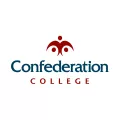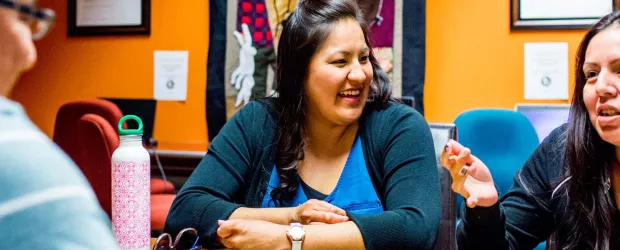Start Dates & Ontario Colleges Program Codes:
- Fall Start (September): 0670
- Fall Start (September) Accelerated program: 0671
CIP Code: 19.0701
Come Join Our 1-Year Program
Onajigawin Indigenous Services Program: Preparing the Next Generation of Helpers with a Focus on Cultural Safety
- Are you committed to honoring cultural diversity?
- Do you strive to support Indigenous children, families, and communities?
- Are you ready to act with integrity, honesty, genuineness, and objectivity?
- Do you want to equip yourself with tools focusing on prevention and well-being to support those you walk with as a future helper?
If your answer is yes, then the Onajigawin Indigenous Services Program at Confederation College is the perfect fit for you!
Why Choose Onajigawin Indigenous Services?
Our program is deeply rooted in Indigenous Knowledge and Pedagogy, offering a decolonized approach to curriculum and assessment. We are dedicated to providing an education that respects and integrates Indigenous ways of knowing, ensuring our graduates are prepared to make a meaningful impact in human services.
Overcoming Barriers, Making Connections
Indigenous communities in northwestern Ontario often face unique cultural, geographical, and systemic barriers to service. The Onajigawin Indigenous Services program equips you with the skills to effectively overcome these challenges. You will learn how to connect individuals and families with essential services in Thunder Bay, the surrounding region, and beyond.
A Pathway to Professional Recognition
Our program prepares you for a fulfilling career in the field of human services, enabling you to become a Helper who can register with the Ontario College of Social Workers and Social Service Workers (OCSWSSW) as a Registered Social Service Worker (RSSW). Our curriculum is designed to ensure you meet the professional standards required for registration, with a strong emphasis on cultural safety and humility.
Comprehensive Curriculum for Wholistic Service
Our comprehensive curriculum covers a wide range of topics essential for anyone looking to serve families, individuals, and communities:
- Cultural Safety and Continuity
Understand the importance of preserving cultural identity while providing services. - Culture and Language
Learn the critical role of language and culture in community well-being. - Intergenerational Health and Well-Being
Explore strategies to support health across generations. - Indigenous Wellness and Addictions Prevention
Gain insights into promoting wellness and preventing addiction within Indigenous communities. - Child and Family Well-Being and Reform
Study approaches to enhance the well-being of children and families. - Social Aspects of Aging
Address the unique needs of aging populations within Indigenous contexts. - Holistic Family Conferencing
Discover holistic methods for resolving family issues. - Social Justice and Advocacy
Develop skills to advocate for social justice and policy reform. - Governance and Policy
Learn about Indigenous governance structures and policy-making processes.
Embrace Indigenous Resurgence
Join us in a transformative educational journey where you will:
- Expand Your Ways of Knowing: Broaden your understanding through Indigenous perspectives.
- Challenge Your Positionality: Reflect on your own position and biases.
- Learn to Decolonize: Embrace and promote decolonized practices in your work.
- Embrace Indigeneity: Celebrate and integrate Indigenous identities and cultures.
The Time for Indigenous Resurgence is Now!
Take the first step towards a fulfilling career that makes a real difference. Enroll in the Onajigawin Indigenous Services program and become a leader in human services, advocating for the well-being and empowerment of Indigenous communities.
Note: We are excited to share the following details of the transition to the NEW Onajigawin Indigenous Services program (formerly Native Child and Family Services program) (as announced on June 16, 2021).
Top Highlights
- Graduates are eligible to register with the Ontario College of Social Work and Social Service Workers as Registered Social Service Workers.
- Prepare for positions in a variety of human service/helper settings including child welfare agencies, women’s shelters, urban Indigenous organizations and on-reserve services
- Field placements provide hands-on experience working with Indigenous and non-Indigenous organizations
- Also offered as an accelerated program for those with a college diploma or university degree in a related field
- You might also be interested in our Social Service Worker program
Program Learning Outcomes
The graduate has reliably demonstrated the ability to:
- Prepare and present a plan for engaging in ongoing personal and professional development that promotes personal wellness and competence as an Onajigawin (being prepared for the work as a helper – preparedness).
- Implement responsive and relevant services for Indigenous children, youth and families that reflect the historic, legislative and intergenerational experiences of Indigenous peoples.
- Establish and maintain therapeutic relationships that promote healing, facilitate family preservation and that support positive change for Indigenous children, youth and families.
- Promote and support the health of Indigenous children, youth and families by using holistic assessments and culturally appropriate preventions/interventions and holistic healing practices.
- Plan and implement accessible and responsive programs and services that are sensitive to the diverse perspectives of Indigenous peoples.
- Establish relationships and work collaboratively with community resources, government departments and agencies to provide support to Indigenous children, youth and families.
- Carry out effective case management tasks, as determined by relevant legislation and/or agency mandated guidelines, in a manner that is sensitive to the unique needs of Indigenous children, youth and families.
- Advocate for systemic change that builds on the strengths of Indigenous peoples and promotes social justice while challenging historic patterns of colonialism and oppression.
Graduates of this program are in high demand in Indigenous and non-Indigenous organizations with a focus on strengthening and empowering Indigenous families and children, and working to build healthy communities. These positions may include child welfare, youth outreach, prevention and health promotion, domestic violence intervention, community development, substance abuse treatment and family healing programs.

Explore careers, current wages, employment stats, job postings, and associated education & training.












